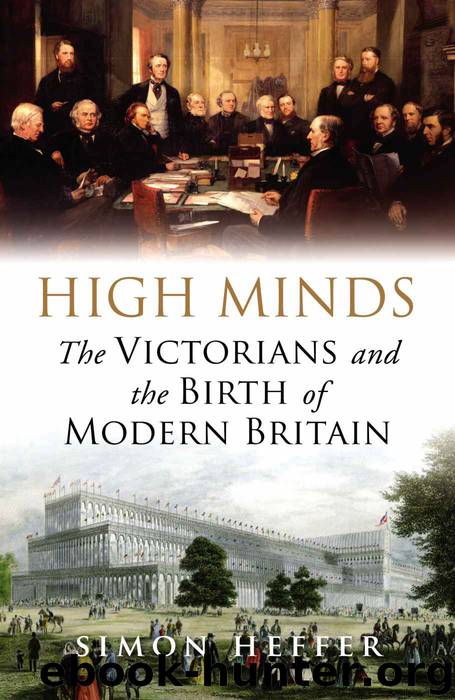High Minds by Simon Heffer

Author:Simon Heffer [Heffer, Simon]
Language: eng
Format: epub
ISBN: 9781847946775
Publisher: Random House
Published: 2013-10-03T00:00:00+00:00
MPs praised Forster for his measure, and for his courage. However, dissenters did not wish to subsidise Church of England schools – or to be forced to send their children to them, as in some areas they would be the only schools available. For attendance to be compulsory, this had to be overcome. It was feared elections to school boards would become a battleground for sectarianism. Therefore, on 14 March George Dixon, one of three Liberal MPs for Birmingham, moved an amendment to force all schools assisted by the rates to be non-sectarian: and to ensure that in other schools religious instruction could be given at a specified time when children from different denominations could miss it. It could not, the amendment said, be left to local authorities to decide what the religious instruction in their schools would be. Dixon’s amendment was consistent with the ideals Joe Chamberlain had drawn up for the Birmingham Education Society in 1867.
Chamberlain was the driving force behind the National Education League and, although he did not yet sit in Parliament and was unknown to the Liberal front bench, it would be he who would shape the debate on education, unseen and unheard. He had, on behalf of the League, sent what he described as an ‘inflammatory’ circular to all its branches advising Nonconformists to let their MPs know the force of their objections to Forster’s proposals.97 He briefed Dixon, whom he knew well, and arranged for him to lead a deputation of forty-six MPs and more than 400 Nonconformists to Downing Street on 9 March. Chamberlain joined the deputation, and it was the first time he met Gladstone.
He addressed the Prime Minister on behalf of the League, principally on their fear that the bill would hand over education to the Church of England, but also on the importance of the State paying fees for children whose parents could not afford them. Chamberlain also argued that a ‘conscience clause’ would be inoperable. It was on that point, notably, that the government and the Nonconformists would disagree. William Harcourt, a Liberal, thought the notion of rival sectarians teaching religion out of school hours would be ‘nothing but denominationalism run mad.’98 The government agreed to modify the bill to allow all shades of feeling to be represented: not least because, as Lowe said on 15 March, the State owed a debt to the voluntary system for all it had done before the State had recognised ‘the undoubted duty of the Government of England to provide for the education of the people’.99 The voluntary system did not deserve to be trampled under a desire for uniformity. Forster, however, became irritated by the infighting between various sorts of Liberal and various sorts of clergy. He wrote on 1 April 1870 to Charles Kingsley, a supporter of the National League. ‘I still fully believe I shall get my bill through,’ he told him, ‘but I wish parsons, Church and others would all remember as much as you do that children are growing into savages while they are trying to prevent one another from helping them.
Download
This site does not store any files on its server. We only index and link to content provided by other sites. Please contact the content providers to delete copyright contents if any and email us, we'll remove relevant links or contents immediately.
| Africa | Americas |
| Arctic & Antarctica | Asia |
| Australia & Oceania | Europe |
| Middle East | Russia |
| United States | World |
| Ancient Civilizations | Military |
| Historical Study & Educational Resources |
Life of Elizabeth I by Alison Weir(2079)
The Invisible Wall by Harry Bernstein(1799)
Art of Betrayal by Gordon Corera(1429)
1916 in 1966 by Mary E. Daly(1282)
Thunderstruck by Erik Larson(1260)
The Decline and Fall of the British Empire, 1781-1997 by Piers Brendon(1124)
A Brief History of Britain, 1066-1485 by Nicholas Vincent(1038)
A Brief History of Britain, 1485-1660 by Ronald Hutton(1008)
Guy Burgess by Stewart Purvis(1004)
Mary, Queen of Scots by Weir Alison(990)
Henry VIII by Alison Weir(937)
The Last Lion 02 - Winston Churchill - Alone, 1932-1940 by William Manchester(934)
Fifty Years On by Malachi O'Doherty(909)
Lang Lang by Lang Lang(877)
1066 by Andrew Bridgeford(859)
Gimson's Kings and Queens by Andrew Gimson(856)
Coalition by David Laws(840)
The Last Plantagenet by Thomas B Costain(838)
London: A Biography by Peter Ackroyd(830)
